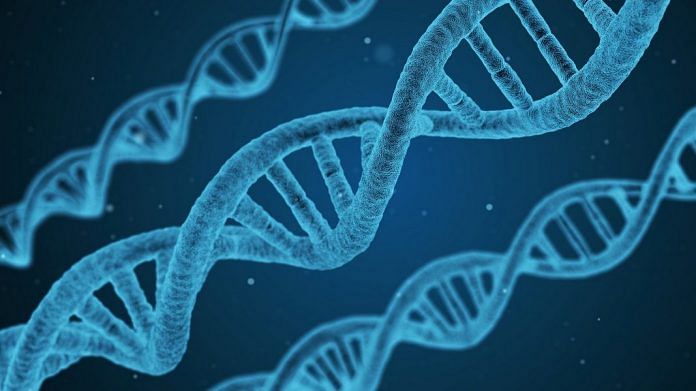New Delhi: Global toll from the coronavirus pandemic crossed one million this week, even as scientists struggle to find a cure for the viral infection.
Here are some of the latest scientific findings on the Covid-19 front.
Genetic defects in immune systems of severe Covid patients
Genetic and immunological analyses of blood samples from 650 severe Covid-19 patients from across the world have shown that some of these people have an inherited immunodeficiency due to which they were the worst affected.
This immunodeficiency leads to the antiviral interferon either not getting produced or not working on the body’s cells. Interferon is an important immune hormone.
Blood samples from 1,226 healthy individuals, taken prior to the pandemic, were used for comparison in this study, that was published in the journal Science.
The research found that in a vast majority of people, infection with Covid-19 leads to an antiviral response, in which interferon plays a crucial role. Interferon helps slow viral replication and prevents the pathogen from penetrating surrounding cells. But inherited immunodeficiency interferes with the functioning of antiviral interferon.
The researchers identified 13 different genetic defects linked to the immune system that specifically affect patients infected with Covid-19.
The research team will now conduct further clinical trials to see if it is possible to screen these 13 critical genes and identify vulnerable individuals. People with such conditions will then be able to receive preventative medical treatment, the researchers said.
Also read: Snakehead fish species found in Kerala a living fossil, belongs to unique family, study says
Natural enzyme may help suppress viral replication
Catalase, a naturally-occurring enzyme, can act as a low-cost therapeutic drug to treat Covid-19 symptoms and suppress viral replication inside the body, scientists have suggested.
In a study, published in Advanced Materials, researchers showed that catalase can repress the replication of SARS-CoV-2 virus in monkeys, without noticeable toxicity.
Catalase is produced naturally and utilised by humans, animals and plants. Inside cells, this antioxidant enzyme kick starts the breakdown of hydrogen peroxide, which can be toxic, into water and oxygen. The enzyme is also commonly used worldwide in food production and as a dietary supplement.
The team found that the enzyme has the ability to regulate the production of cytokines, a protein that is produced in white blood cells. Over-expression of these proteins can cause a ‘cytokine storm’ reported in patients with severe Covid-19.
The team also showed that catalase can protect cells in the lungs from damage.
Diabetes drug may help reduce mortality
Sitagliptin, a drug to lower blood glucose levels in type 2 diabetes patients, can help improve survival rates among diabetic Covid-19 patients, according to a new study from Italy.
Researchers have found that diabetic Covid-19 patients who are given sitagliptin, in addition to insulin, had a mortality rate of 18 per cent as compared with 37 per cent in patients receiving only insulin.
The findings, published in Diabetes Care, have encouraged the team to start a new clinical trial of sitagliptin.
Based on sitagliptin’s mechanism of action, the team believes that it could also work in non-diabetic patients with Covid-19.
Sitagliptin, an oral drug, is prescribed to an estimated 15 to 20 per cent of patients with type 2 diabetes. It lowers blood sugar by blocking the receptor for the enzyme DPP-4 (also known as CD26), causing an increase in insulin production.
Recent studies suggest that DPP-4 may also help the novel coronavirus enter respiratory cells. In addition to blocking DPP-4, sitagliptin has anti-inflammatory effects, reducing production of the cytokine.
Excess social media use for Covid-related information linked to depression
Excessive use of social media for health information on Covid-19 is related to both depression and secondary trauma, scientists have suggested.
The study, published in the journal Computers in Human Behavior, included 320 participants living in China.
In February 2020, the team gave these participants an online survey that investigated how they accessed and shared health information with family members, friends and colleagues on social media, specifically WeChat, China’s most popular social media mobile app.
The team found that social media use was rewarding up to a point, as it provided informational, emotional and peer support related to Covid-19 health topics. However, excessive use of social media led to mental health issues.
The team suggests that one should take regular breaks from social media to promote mental well-being during the pandemic.
More than half of the participants of the survey reported some level of depression, with nearly 20 per cent of them suffering moderate to severe depression.
Among the respondents who reported secondary trauma, 80 per cent reported a low level of trauma, while 13 per cent reported moderate and 7 per cent reported high levels of trauma.
None of the participants reported having any depressive or traumatic disorders before the survey was conducted.
Also read: Red blood cell changes could help identify Covid patients with higher death risk, study finds



